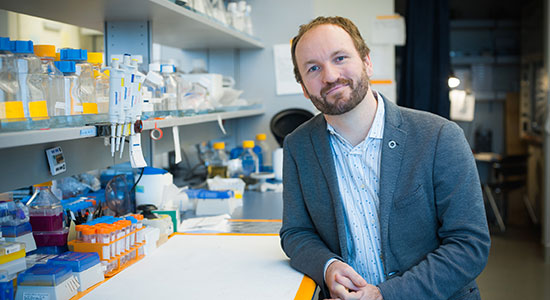James Johnson, Associate Professor in the Department of Cellular and Physiological Sciences, won a $625,000 grant from Novo Nordisk to pursue research that could upend conventional notions about the interplay between insulin, obesity and diabetes.
Insulin is the hormone that enables glucose to be stored by muscle and fat cells, but there is still much scientists do not understand about its complete effects on the body.
The Novo Nordisk Diabetes Innovation Award supported continuation of Dr. Johnson’s experiments on the effects of varying levels of insulin and different types of insulin, testing the idea that high levels of circulating insulin might actually be a cause of obesity, rather than an indirect effect.
The commonly accepted explanation for Type 2 diabetes, also known as “adult-onset” diabetes, is that obesity causes tissues to become resistant to insulin, after which the pancreas responds by producing even more of the hormone. Diabetes is thought to result when the pancreas’ capacity to produce insulin wears out, leading to elevated blood sugar.
Dr. Johnson has employed a unique feature of mouse physiology, the fact that mice have two types of insulin genes rather than one, to test a hypothesis that could not otherwise be tested. Insulin 1, which is unique to mice, is found only in the pancreas, whereas Insulin 2, like human insulin, can be found in the pancreas and the brain. That feature allows Dr. Johnson to isolate the effect of pancreas-produced insulin from brain-produced insulin for the first time, using mice lacking either the Insulin 1 or Insulin 2 gene. This is important because previous research has shown that insulin can have potent effects on the brain, controlling appetite and thus food intake.
“If we find different roles for pancreas-produced insulin versus insulin in the brain, that would lead to a thorough re-thinking of how we prevent and treat obesity and diabetes” Johnson says. “Moreover differential effects of Insulin 1 and Insulin 2 might hint at ways of building more targeted insulins”.
The Novo Nordisk Diabetes Innovation Award Program was launched in 2011 to help scientists substantiate early research efforts that could result in new treatment options for diabetes and obesity. Johnson was awarded one of three in Canada in the first round.
Since the conclusion of the award in 2013, Johnson has maintained a productive working relationship with the company. Starting in 2014, he will co-supervise a Masters student who is seeking to follow up on Johnson’s recent work on insulin receptors. He has also attracted a recent PhD graduate from Novo-Nordisk/University of Copenhagen to join is lab as a post-doc. This is an example of how a common interest in basic biology can lead to many interactions between academia and industry.
“Working with scientists at Novo Nordisk has been a tremendous experience” says Dr. Johnson.
About Novo Nordisk
Headquartered in Denmark, Novo Nordisk is a global healthcare company with 88 years of innovation and leadership in diabetes care. The company also has leading positions within haemophilia care, growth hormone therapy and hormone replacement therapy. For more information, visit novonordisk.com. More information about the Novo Nordisk Diabetes Innovation Award Program can be found at www.novonordisk-us.com/innovation.
